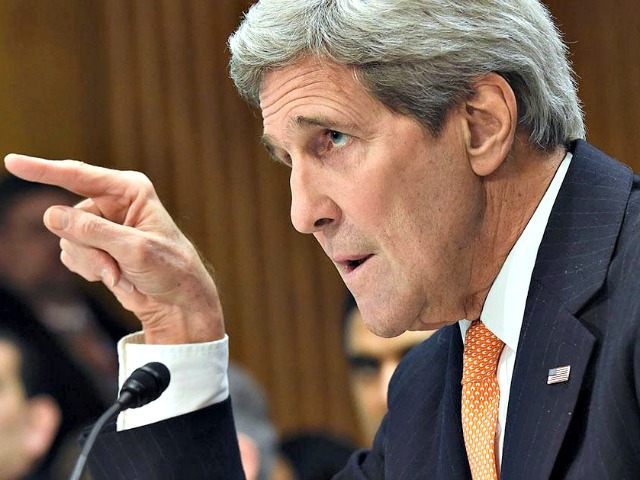The Afghan Taliban reportedly claims U.S. Secretary of State John Kerry was the target of the rocket strikes that struck Afghanistan’s capital Kabul on Saturday night.
CNN reports that the terrorist group made the allegation in a statement.
“The attacks in Kabul on Saturday night came within an hour after Kerry had departed Afghanistan, following a visit aimed at defusing a political crisis in the unity government he helped build,” notes the report.
Sediq Sediqqi, an Afghan government spokesman, is cited as indicating that no casualties resulted from the rocket attacks.
“But they underscored the volatile security situation in the country as warmed weather brings increased fighting,” adds CNN. “There was no additional information to verify the Taliban’s claim, but CNN’s team in Kabul heard four loud explosions near the diplomatic area of the city Saturday night.”
Khaama Press reports that various rockets were fired into Kabul on Saturday.
“Earlier reports suggested a number of rockets were fired from unknown location which landed in key parts of the city,” mentions the news outlet. “According to the reports, 3 rockets landed in police districts 2 and 10th of the city with one of the rockets impacting a building belonging to girls school. [sic]”
The second police district is reportedly located near the presidential palace and some ministries in the Afghan capital.
Security conditions appear to be deteriorating in Kabul.
Two days after the rocket attacks, an Improvised Explosive Device (IED), also known as a homemade bomb, was detonated in Kabul, killing two Ministry of Education (MoE) employees and wounding up to seven others, Khaama Press reports.
No specific terrorist group has reportedly claimed responsibility for the IED attack.
Also on Monday, the U.S. Embassy in Kabul issued a warning telling American citizens it had “received reports that insurgents are planning to conduct attacks targeting The Star Hotel in Kabul City.”
“In response to this potential threat, the U.S. Embassy Kabul is advising American citizens to avoid the Star Hotel, and to remain vigilant when visiting hotels in Kabul, especially during large gatherings,” it adds.
The warning did not specifically identify the insurgents as Taliban members, but they are the ones behind the majority of terrorist attacks in Kabul in recent years.
The embassy warned American citizens against traveling to Afghanistan, acknowledging that after nearly 15 years of war, the country remains insecure.
The American embassy, a component of the U.S. State Department, declares:
The security situation in Afghanistan is extremely unstable, and the threat to all U.S. citizens in Afghanistan remains critical. U.S. citizens currently visiting or residing in Afghanistan may wish to consider departing. The Embassy strongly urges U.S. citizens who decide to remain in Afghanistan to review your personal security plans, take appropriate steps to enhance your personal safety, remain aware of your surroundings, monitor local media for updates, and maintain a high level of vigilance.
Kerry’s surprise visit to Afghanistan on Saturday was aimed at bringing Afghanistan’s President Ashraf Ghani and Chief Executive Abdullah Abdullah together. They both share power in a national unity government that Kerry helped create.
The Taliban has declined to participate in peace talks with the Afghan government, arguing that it is winning and has no reason to negotiate.
Since President Obama withdrew most U.S. forces from Afghanistan and declared an end to the U.S. combat mission in December 2014, Taliban insurgents have been gaining territory. As of the beginning of February 2016, the U.S. military lacked the authority to offensively attack the Taliban.
The Islamic State (ISIS/ISIL) is also seeking to expand its footprint in Afghanistan. Yet, the Special Inspector General for Afghanistan Reconstruction (SIGAR), a watchdog agency appointed by Congress, recently questioned the capabilities and effectiveness of the Afghan security forces.
The U.S. has spent years and billions of dollars on developing the security forces in Afghanistan.

COMMENTS
Please let us know if you're having issues with commenting.